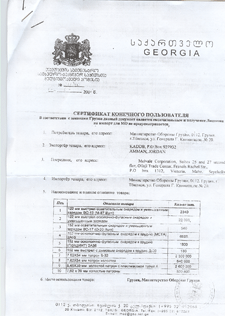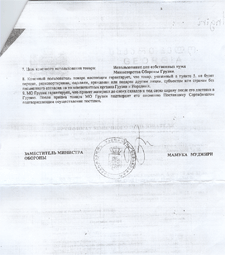Weapons Trafficking, End User is NOT Georgian Territorial Integrity
By Jeffrey K. Silverman, Human Rights Centre
 The fallout of the war of August 2008 brings us up to speed with a much larger game that is being planned and played-out within the framework of today's security reality. I've always suspected Georgia of having been, perhaps even before the final breakup of the USSR, a hub and transit point for most every illicit item one could imagine. It is about location and its topography - mountainous forests, the Black Sea – all make it perfect for such. Conflicted areas such as Georgia and other breakaways provide generous conditions for all kinds of illegal and shady activities.
The fallout of the war of August 2008 brings us up to speed with a much larger game that is being planned and played-out within the framework of today's security reality. I've always suspected Georgia of having been, perhaps even before the final breakup of the USSR, a hub and transit point for most every illicit item one could imagine. It is about location and its topography - mountainous forests, the Black Sea – all make it perfect for such. Conflicted areas such as Georgia and other breakaways provide generous conditions for all kinds of illegal and shady activities.
It is well documented in international press, much to the dismay of the Russian Federation that arms shipments from Serbia and other former East Block countries have been made to Georgia. However, the question is who in the actual end user? This question takes on special meaning.
Jordan has emerged as a new player in the international trafficking of weapons. Using intermediary companies, Jordan has found a niche market in the supply of offensive weapons that may be used against longtime US allies, such as Turkey.
Aside from the possibility that Russian Federation is actually concerned with this matter, especially for the sake of its so-called peacekeepers on Georgia territory, it has repeatedly officially appealed to the leadership of Serbia to cut off the supply arms and ammunition to Georgia. The Serbian leadership has repeatedly assured the Russian Federation that it will under "no circumstance" continue supplying weapons to the Georgian government that could be used inappropriately used.
In short, Belgrade categorically refuses to supply Serbian weapons to Tbilisi reads
a statement in the Russian press. it has even transmitted a message to a correspondent of the Russian peacekeepers," the Foreign Ministry of Serbia - in a special message it claimed that it understood the situation in the Georgian conflict zones, and how it would categorically guarantee that no weapons are being supplied that could be potentially used against Russian Peacekeepers. The weapons in question are allegedly produced in the arms manufacturing plants of Serbia and other former State Enterprises that Serbia has under its authority.
Serbia banned the export of weapons into the South Caucasus but that does not cover what has already been exported to Jordan and other stable countries, including various US allies; it is now known that these weapons are being shipped back into Georgia as a cover for the actual end user.
It is still "debatable" – however, if these deliveries are for Georgian defense purposes or was this mechanism is just a component part of a larger shell game in the shady world of international weapons trafficking.
Regardless of the ledger of guilt or innocence, it does appear that Russian and its defense ministry may have been correct in their finger pointing and repeated recriminations - and about a potential NATO member country was involved. Not only may the Georgian government actually be in the dark, but the government of Jordan as well.
It would be interesting to know the official government position as to why an exporter in Amman Jordan is sending otherwise illegal shipments of Serb produced weapons to Georgia and why the Melvale Corporation, a well-known intermediary for arms dealers is being used as the agent. It is conceivable that this was done under the corruption of Irakli Okruashvili, the former Georgian Minister of Defense, or he was just totally unaware that his Ministry and key staff were likely involved in the wholesale trafficking of weapons.
It is even more contradictory that a potentially NEW NATO member could in anyway be tied up in the supply of weapons, directly or indirectly to Georgia. These weapons may even end up being used against old NATO countries. This discussion goes beyond the Old and New Europe that we learned about so well in the run up to the US invasion and long-term occupation of Iraq.
With easy money comes dirty deals: those that have been involved in this trade for years is not going to let NATO membership aspirations get in the way of business as usual. "Easy Money" means continued arms exports to Georgia and points beyond, and if this cannot be by direct routes, there are other means – and the old adage still hold true, wherever there is a will there is a ALWAYS a way.
Melvale Corporation
The Melvale Corporation under the umbrella of a contract previously concluded with the Georgian Ministry of Defense has publicly claimed that the Georgian side had been sold weapons for the sole purpose of training exercises.
These materials were never intended for offensive purposes. The sale falls within the standards of accepted international practice. It is clear, however, that there has been much talk about the possibility that these weapons were going be used to resolve the problem of territorial integrity for Georgia and were going to be used against Russian peacekeepers, sooner or later.
The Serbian media reports that the Melvale Corporation is officially registered in the Seychelles, but the actually owners are Serbs, Messures Nenad Sharenach and Slobodan Tesic. Melvale Corporation has purchase weapons for resale to Georgia. These appear to have been originally purchased from Jugoimport and later sold to Jordan. Regardless of the recriminations that have resulted from much of the Serbian-Georgian weapons link and the Georgian-Russian war of August 2008, more information is now beginning to surface.
First of all, the larger contract with Georgia stipulated that by the end of 2007 that the Georgian Ministry of Defense would be delivered over 110,000 artillery shells. At this stage conveyed list includes: 125-mm artillery shell cumulative shots, shots of 125-mm armor-piercing shells "podkalibernym" basic charges for the 60-mm and 82-mm, 122-mm artillery shells-fragmentation projectiles and decreased charges. That sounds like cluster bombs but it is hard to understand what is in the reported press compared to what is actually written in the end user certificate.
Naturally the leadership of Serbia and Ukraine, both major suppliers of weapons on an international level, must fully understands the concerns of the Russian Federation that their arms factories are churning out war materials that would end up killing Russian citizens. However, arms dealer have a better organized lobby in Belgrade and Kiev than do ministry officials and human rights defenders.
End User Certificate
According to Georgian Laws, User of Cargo:
Ministry of Defense of Georgia, 0112
Tbilisi, 20 General G. Kvinitadze Street
Exporter of cargo, address: KADDB. PO Box 927932, AMMAN Jordan
Intermediary address: Melvale Corporation, Suites 25 and 27 2nd Floor, Oliaja Trade Center, Francis Rachel Str., Box 1312, Victoria, Mahe, Seychells
Place for use of the cargo: Georgian Ministry of Defense.
It is interesting that the Russian GRU appears to have been connected with this company for years (based on local sources); it has had dealing with Batumi and local stakeholders, especially as it relates to scrap metal and metal rods. The materials they officially trade at public level is confirmed by the website of the intermediary company, Melvale Corporation, which has been involved in the arms trade for a long time based on various media reports.
The documents state the intended use of the cargo "to be used for the sole needs of the Georgian Ministry of Georgia." These documents were shared with me in both Russian and an English translation. The end user certificate is on an official letterhead of the Georgian Ministry of Defense and it is signed by Mamuka Mujiri, Deputy Minister of Defense, Logistic Support Department.
It lists the full amount of a shipment of arms. "The end user of the cargo, herewith guarantees that the cargo, described in point 5, will not be given, re-exported, lent, rented, or [gifted] to other persons, subject or countries without the written consent of the authorized organs of Georgia and Jordan."
Moreover, the Georgian Ministry of Defense further guarantees to accept the materials in its warehouses and keep them under its security after the delivery to Georgia. After accepting the cargo, the Ministry of Defense will confirm this in writing through a Certificate to the Supplier, confirming realization of the delivery.
Does the metal business include weapons (Iron and non-alloy steel)?
From Internet Search
Melvale Corporation, Country SC Seychelles
Biz Type
Trading Company
Biz Category
(as a seller) Mineral & Metals, Iron & Non-alloy Steel
Address: Suites 25 and 27 Second Floor, Oliaji Trade Victoria Mahe . Seychelles
Export Items
Steel Billets, Debars, Wire Rod
The question is now why have "metal objects" been exported directly from Jordan. Few ever thought these weapons are going to be used in Georgia for territorial integrity or training purposes. Naturally there are three other possibilities: Iran, Northern Iraq (Kurdistan), and points beyond; this is only the beginning of the list of end users.
While using this information, mention the portal www.humanrights.ge --
 The fallout of the war of August 2008 brings us up to speed with a much larger game that is being planned and played-out within the framework of today's security reality. I've always suspected Georgia of having been, perhaps even before the final breakup of the USSR, a hub and transit point for most every illicit item one could imagine. It is about location and its topography - mountainous forests, the Black Sea – all make it perfect for such. Conflicted areas such as Georgia and other breakaways provide generous conditions for all kinds of illegal and shady activities.
The fallout of the war of August 2008 brings us up to speed with a much larger game that is being planned and played-out within the framework of today's security reality. I've always suspected Georgia of having been, perhaps even before the final breakup of the USSR, a hub and transit point for most every illicit item one could imagine. It is about location and its topography - mountainous forests, the Black Sea – all make it perfect for such. Conflicted areas such as Georgia and other breakaways provide generous conditions for all kinds of illegal and shady activities.
 , ...... the last third of this article does indeed go over some of the faults of the
, ...... the last third of this article does indeed go over some of the faults of the 
